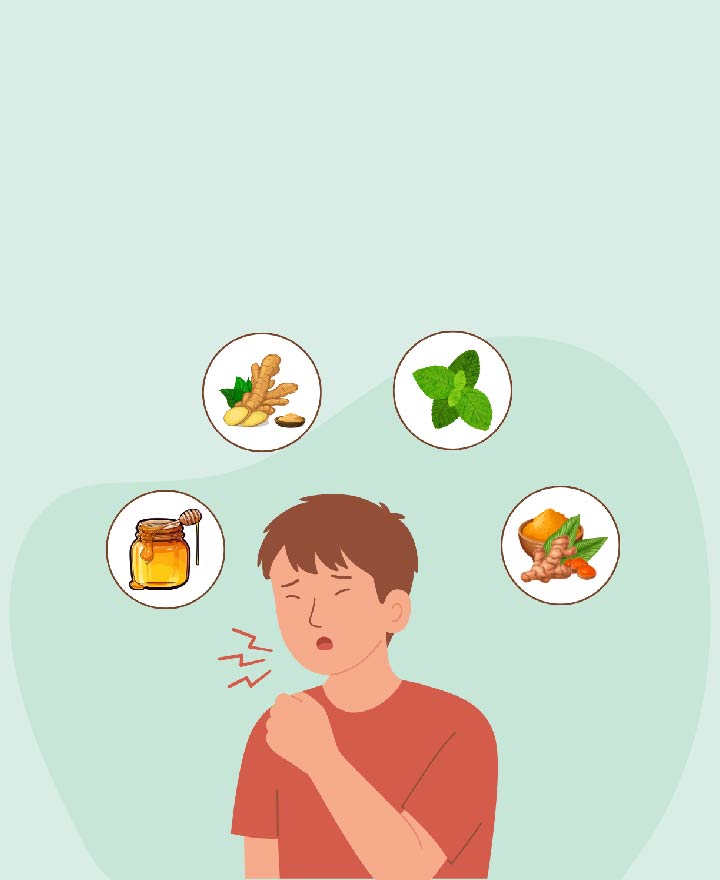

13 Home Remedies for a Dry Cough
Dry coughs can be very uncomfortable and may occur in both children and adults. There are a number of clinical treatments you can use to alleviate them, but there are also at-home remedies which can be just as effective in many cases. Read on to know more.
Remedies for Dry Cough
At-home remedies for dry cough aren’t one-size-fits-all. You may have to experiment with several before you find the ones that work for you. These include:
1. Honey
Honey has antibacterial properties and can also help to coat the throat, alleviating irritation. For adults and children ages 1 and up, honey can be used to treat day and nightime dry coughing.
You can try taking honey by the teaspoon several times daily, or add it to tea or warm water to drink.
2. Ginger
Ginger has antibacterial and anti-inflammatory properties.
Chewing on ginger root or taking ginger in capsule form can help alleviate dry cough.
3. Peppermint
Peppermint contains menthol, which helps to numb nerve endings in the throat that get irritated by coughing. This may provide pain relief and reduce the urge to cough. It also helps to relieve congestion.
You can take peppermint in various ways which includes drinking peppermint tea or sucking on peppermint lozenges. Even drinking peppermint tea before bed time can help alleviate night-time coughs.
4. Gargle with Salt Water
This will help ease the discomfort and irritation caused by a dry cough. Salt water also helps kill bacteria in the mouth and throat.
To do this, dissolve 1 teaspoon of table salt in a large glass of warm water. Then gargle several times a day. This remedy is not advisable for young children as they might swallow the salt water.
5. Turmeric
Turmeric contains a compound, curcumin which may have anti-inflammatory, antiviral, and antibacterial properties. It may also be beneficial for several conditions, including a dry cough.
You can add 1 teaspoon of turmeric and 1/8 teaspoon of black pepper into a beverage, such as cold orange juice, to drink. You can also make it into a warm tea.
6. Steam Inhalation
This can have a soothing and healing effect.
Adding few drops of eucalyptus oil to this may help to ease dry cough by working as a decongestant.
7. Hot fluids
This includes warm water, tea, coffee, and clear broth soup which can ease pain and irritation in throat.
Commonly, masala chai is used to treat conditions such as sore throat and dry cough as this contains several antioxidant ingredients, including cloves and cardamom. Cloves may also be effective as an expectorant.
8. Marshmallow root
It is a type of herb used in cough syrup and in lozenges to soothe dry cough. It may also have antibacterial properties.
9. Use an Air Purifier
Air purifiers can help to get rid of airborne irritants from your home, such as dust and smoke.
Whether your cough is caused by environmental toxins or an underlying condition, breathing in clean air can help reduce throat irritation and the desire to cough.
10. Slippery elm
Slippery elm can be used as an alternative to marshmallow root due to its identical contents.
You can add it to your tea and consume it. Besides this, it is also available in both capsule and powder form.
11. Capsaicin
Capsaicin, a compound found in chili peppers, has been shown to reduce chronic coughing.
While capsaicin can be taken as a capsule, you can also make tea from cayenne pepper hot sauce and warm water. Please note, Capsaicin-based treatments aren’t recommended for children.
12. Use a Humidifier
Humidifiers put moisture into the air, which can provide relief as dry air can aggravate dry cough.
If you are suffering with dry cough and your home has dry air, using a humidifier can help reduce it.
13. Cough drops
Cough drops are medicated lozenges designed to lubricate and soothe irritated throat tissues. Their ingredients vary and so do their actions.
When to see a Doctor?
Dry cough can last for about 2 months and it usually stops on its own. However, if your cough is accompanied by below listed symptoms then consult a doctor.
- Trouble breathing
- Wheezing
- Chest Pain
- Fever & chills
- Back pain
Conclusion
Dry cough can be both long-lasting with numerous causes. But there are several highly effective at-home treatments, which can alleviate your cough.
One of the important components of our overall wellness is also being financially secured. Healthcare emergencies can happen any time, but a good health insurance can protect you from such uncertain situations. To know more about it, click here
Source: Healthline, VeryWellHealth
Disclaimer: This blog provides general information and discussions about health and related subjects. The information and other content provided in this blog, website or in any linked materials are not intended and should not be considered, or used as a substitute for, medical advice, diagnosis or treatment. Kindly contact your Doctor before starting a new medicine or health regime.
Related Articles
8 best practices for healthy teeth and gums
Bone health tips to keep your bone healthy
20 foods you should be eating everyday for a longer life
6 types of food to eat when detoxing from alcohol
Published on February 07, 2023

















 Health Insurance
Health Insurance  Travel Insurance
Travel Insurance  Car Insurance
Car Insurance  Cyber Insurance
Cyber Insurance  Critical Illness Insurance
Critical Illness Insurance
 Pet Insurance
Pet Insurance
 Bike/Two Wheeler Insurance
Bike/Two Wheeler Insurance  Home Insurance
Home Insurance  Third Party Vehicle Ins.
Third Party Vehicle Ins.  Tractor Insurance
Tractor Insurance  Goods Carrying Vehicle Ins.
Goods Carrying Vehicle Ins.  Passenger Carrying Vehicle Ins.
Passenger Carrying Vehicle Ins.  Compulsory Personal Accident Insurance
Compulsory Personal Accident Insurance  Travel Insurance
Travel Insurance  Rural
Rural